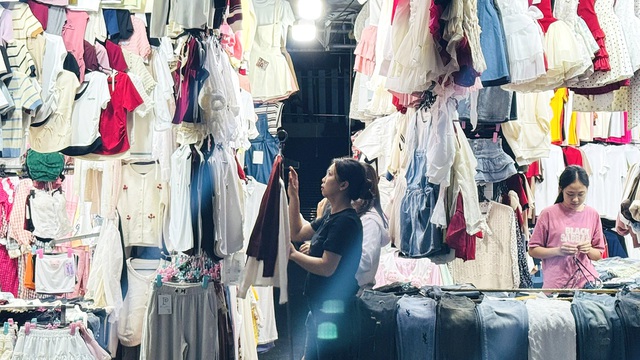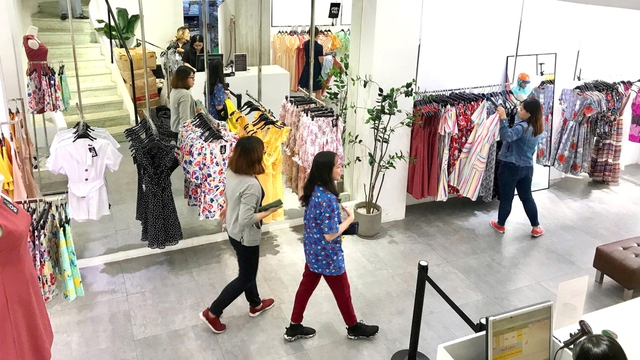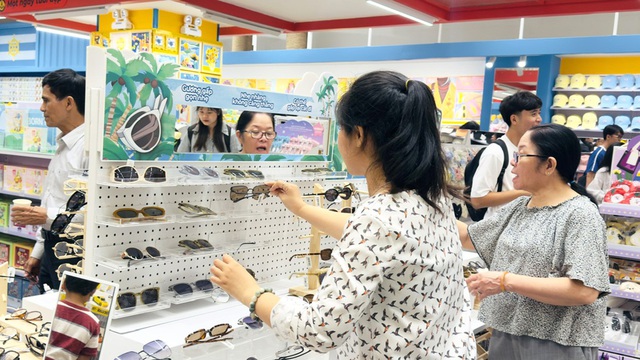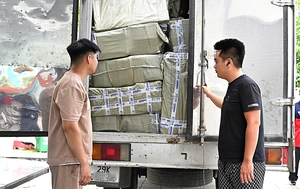
Vendors at traditional markets in Vietnam face intense pressure as low-cost foreign goods flood online platforms. Photo: Bong Mai / Tuoi Tre
Imported goods—often low-cost and of questionable quality—enter Vietnam tax-free if their value is under VND1 million (US$38), exploiting a loophole that domestic sellers argue creates an unfair playing field.
While local firms must comply with taxes, invoices, labor regulations, and operating expenses, foreign sellers enjoy cost advantages, making them formidable competitors even in everyday household markets.
Local fashion brands fold under pressure
The impact is clearly evident in the number of local fashion brand owners scaling down or even shutting down their businesses in the year to date.
Maison Long, after nearly seven years developing casual fashion lines, recently shut down its women's segment, with its founder Nguyen Tran Duc Long citing limited resources and rising competition as key reasons.
Hnoss, a women’s fashion brand established 16 years ago, also announced its closure, withdrawing from physical and digital sales channels.
Co Hue Anh, founder of Hnoss, described the brand as a "youthful dream" that could not keep up with the price war.
Edini, another local label, followed suit after 12 years.
"We couldn’t sacrifice quality just to join a race to the bottom," said Edini founder Quyen Nguyen.
Even longtime online resellers like K. Thanh in Ho Chi Minh City elaborated that they can no longer profit by importing goods from China for resale, as Chinese sellers now reach Vietnamese consumers directly—offering lower base prices and cheaper shipping.

EDINI, a local fashion chain in Vietnam, recently stopped selling women's casual clothes, shifting focus to higher-end ao dai (Vietnamese traditional long gown) line. Photo: Edini
An uneven playing field
According to Associate Professor Nguyen Huu Huan of the University of Economics in Ho Chi Minh City, Vietnam’s current tax policy gives foreign goods a leg-up.
"Domestic firms are at a disadvantage because they still pay full taxes while imported goods under VND1 million [$38] are tax-exempt," Huan said.
The threat is not just financial.
“This loophole also encourages smuggling, invoice fraud, and undeclared commercial imports disguised as personal purchases,” warned Huynh Ho Dai Nghia, a public policy lecturer at the Ho Chi Minh City University of Economics and Finance.
China, facing trade pressure from the U.S., has redirected low-cost exports to many countries, including Vietnam.

Numerous stores specializing in Chinese-origin products have emerged in Vietnam, alongside a wave of China’s online vendors selling goods targeting Vietnamese consumers. Photo: Bong Mai / Tuoi Tre
With large-scale production and advanced logistics, Chinese goods overwhelm smaller Vietnamese firms that cannot match scale or prices.
A report by e-commerce market research platform Metric revealed that over 80 million imported products worth VND3.6 trillion ($138 million) were sold on Shopee Vietnam in the first quarter of 2025, up 7.1 percent and 12.2 percent year on year, respectively.
Although imports only represent 5.9 percent of total Shopee sales, they are fast gaining ground, especially in low-cost consumer categories.
According to the Vietnamese Ministry of Finance, foreign entities with no physical presence in Vietnam account for 20 percent of total e-commerce revenue. Many of them have evaded taxes entirely due to lax enforcement.
Experts: Time to tax small imports
Many countries worldwide are tightening rules to tackle the flood of cheap online imports.
Vietnamese economists suggested the same.
"Value added tax [VAT] and import tax must be applied even to small parcels," Nguyen Huu Huan said, adding that manual customs processes may slow things initially, but digitization is necessary to ensure enforcement.
Huynh Ho Dai Nghia emphasized the need to link data between buyers, sellers, platforms, and customs to prevent tax evasion and detect commercial imports posing as personal shipments.
Industry calls for fairness, not freebies

Nguyen Lac Huy of CellphoneS retail chain
Nguyen Lac Huy of CellphoneS retail chain called the current import tax exemption a “legal loophole” that allows unregulated imports, often including counterfeit or substandard goods, to flood the local market.
The CellphoneS representative urged policymakers to consider a minimum import tax of around 10-15 percent on all cross-border e-commerce shipments, no matter the value, to protect legitimate businesses and consumers.

Doan Trong Khoi, general director of Vimarket Vietnam JSC
Doan Trong Khoi, general director of Vimarket Vietnam JSC, echoed that call.
“We need a level playing field. Domestic firms pay taxes and comply with standards. Imported goods shouldn’t bypass that.”
Khoi noted that an average Shopee/TikTok order is around VND250,000-300,000 ($10-12), making the VND1-million ($38) threshold overly generous.
Khoi called for practical taxation and support for Vietnamese manufacturers to compete on quality and service.
VCCI: tax-free imports affect local businesses
In response to the Ministry of Finance’s draft decree on customs management over import-export goods traded via e-commerce platforms, the Vietnam Chamber of Commerce and Industry (VCCI) opposed a draft regulation that would continue tax exemptions for low-value imports.
VCCI cited Shopee’s 2024 sales—324 million imported items worth VND14.2 trillion ($546 million), averaging just VND43,682 ($1.7) each—as proof that the exemption is being heavily exploited.
If Vietnamese producers must pay taxes on imported materials while finished foreign goods enter tax-free, the system is clearly imbalanced, VCCI said, calling for comprehensive import tax policies with no exemptions for cross-border e-commerce items.



Max: 1500 characters
There are no comments yet. Be the first to comment.